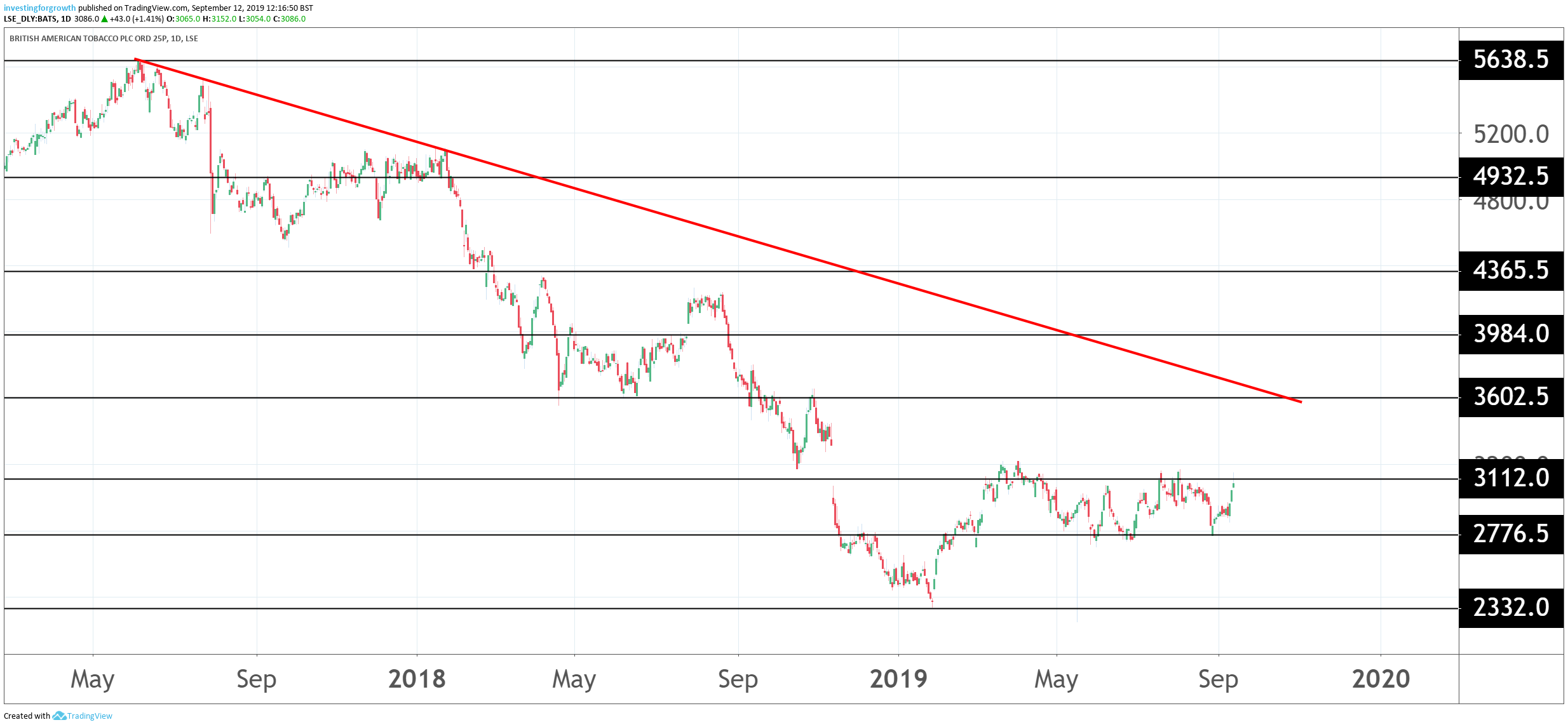British American Tobacco moves to protect dividend
Shares look cheap, but there is concern about the generous dividend. This act might help defend it.
12th September 2019 12:24
by Graeme Evans from interactive investor
Its shares look cheap, but there is concern about the generous dividend. This act might help defend it.

Changes in Big Tobacco continue to come thick and fast, making it harder for income seekers to work out the investment case at heavyweights including British American Tobacco (LSE:BATS).
This fug of uncertainty includes yesterday's news that the Trump administration is preparing an industry ban on flavoured e-cigarettes amid concerns they encourage under-age vaping use.
A few weeks earlier, tobacco share prices were shaken by plans from Philip Morris International (NYSE:PM) and fellow Marlboro maker Altria Group (NYSE:MO) to re-unite in a deal creating a $200 billion industry giant.
- Invest with ii: Top UK Shares | Super 60 Investment Ideas | Most-traded US Stocks
These events and others, including longer-term moves by US regulators to cut nicotine levels in cigarettes, have led to a choppy share price performance for BAT on either side of the 3,000p barrier. A debt mountain of £45.5 billion isn't helping investor confidence at a time when the company's proud dividend record is seen in some quarters as being vulnerable.

Source: TradingView Past performance is not a guide to future performance
Today, new chief executive Jack Bowles took a step towards addressing some of these challenges with a cost savings drive aimed at creating a "more efficient, agile and focused" BAT. His plan for a reduction of 2,300 jobs by January removes layers of management in a move likely to impact 20% of senior roles. No target for the level of cost savings has been disclosed.
Bowles, who became CEO five months ago, wants to increase focus on new category products, which include BAT's flagship vaping brand Vype and tobacco heating product glo.
In early August, he said this division was on track for the middle of its guidance range of between 30% and 50% growth in annual revenues. New category revenues of £548 million in the first half of 2019 were 3.9% ahead of consensus.
Success in these new areas will be key to filling BAT's current valuation gap to other stocks in the European staples sector, which has been as wide as 60%. The shares have been on a 2020 forward earnings multiple of just 8.5 times, which partly reflects the threat of regulation on menthol products in the US, where BAT is exposed due to its acquisition of Reynolds in 2017.
New guidance from the Food and Drug Administration (FDA) will be published shortly, with tobacco companies facing the prospect of having to an undergo a formal approval process for their products.
Morgan Stanley recently downgraded BAT to 'underweight', arguing that the threat from a possible maximum nicotine policy in the United States wasn't reflected in the share price. The bank's analysts said US regulation represented a significant overhang while they also highlighted the slow pace of deleveraging the company's balance sheet.
The recent note said that accelerated cost savings, asset sales and a dividend cut would provide the company with more firepower to invest in new products and categories.
- Can income stock BATS fill valuation gap?
- Podcast: How our six share tips for 2019 have done so far
- How I'm repositioning my income funds for tougher times
BAT hasn't cut its dividend since 1999, with the current policy of paying at least 65% of adjusted earnings per share leading to a dividend yield of just below 7%.
Last year the total dividend increased by 4% to 203p a share, which BATS has distributed in four quarterly payments of 50.75p per share. It continues to generate prodigious amounts of cash, despite the need for heavy investment in new products.
These articles are provided for information purposes only. Occasionally, an opinion about whether to buy or sell a specific investment may be provided by third parties. The content is not intended to be a personal recommendation to buy or sell any financial instrument or product, or to adopt any investment strategy as it is not provided based on an assessment of your investing knowledge and experience, your financial situation or your investment objectives. The value of your investments, and the income derived from them, may go down as well as up. You may not get back all the money that you invest. The investments referred to in this article may not be suitable for all investors, and if in doubt, an investor should seek advice from a qualified investment adviser.
Full performance can be found on the company or index summary page on the interactive investor website. Simply click on the company's or index name highlighted in the article.